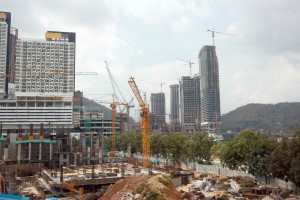GST operational issues affecting property developers
 Property developers are still faced with operational issues that come with the implementation of the Goods and Services Tax (GST), after the consumption tax came into force four months ago.
Property developers are still faced with operational issues that come with the implementation of the Goods and Services Tax (GST), after the consumption tax came into force four months ago.
In a forum to address this issues at the recently concluded Fiabci-Penang International Roundtable Property Conference 2015, Ernst & Young Tax Consultants Sdn Bhd Partner Yeoh Cheng Guan said property developers are faced with several operational issues concerning GST.
“One such issue is registration of GST with the Royal Malaysian Customs. Property developers tend to register new companies for any development to be undertaken, and usually these companies do not have any income, but when you register with Customs, you need to be able to highlight that there is taxable turnover for the company within the next 12 months,” said Yeoh.
He added that the issue arises owing to the nature of the property development business, where there is a long gestation period from the time of development to the point of sale, or when cash is received.
“Twelve months is a short period of time for property developers [to be able to justify their income projections],” he explained.
Meanwhile, property developers who have problems in registering for GST, or did not register at all would lose out on input tax credits.
“For developers of commercial developments, all input tax credits, which is the GST that was charged by suppliers, all these costs are claimable. However, the catch is if you are not registered with customs, you will not be able to claim on whatever GST costs incurred at the development stage prior to earning any income,” said Yeoh.
Another issue plaguing property developers concerns joint land development agreements (JLDA) and how to treat the GST that comes with such arrangements.
Under JLDA arrangements, land owners are handing over a right to develop the land to the property developers, and under GST law, it is considered a supply of services and is subject to GST.
“The issue that comes into play is how do you determine the absolute amount for the right to be charged, as this is something that is usually determined at the end of the project, depending on the yield generated, so what happens now [is that] there is an estimation amount charged by the land owner, and this could then potentially lead to issues of under-declaration of GST and so forth,” said Yeoh.
For residential developments which are GST exempt, the issue surfaces when there are additional fittings to the units, such as air-conditioning, heating system and automatic gate system, which are all subject to GST.
“Supply of residential properties with basic fittings is GST exempt; when there are additional fittings involved, the developer has to recognise the GST for these items as a cost of doing business [and this is where some operational issues arise],”said Yeoh.
He added that property developers need to be on their toes on GST issues, to ensure that their operations are not affected by the implementation of the consumption tax,
On the impact of GST on property prices, Yeoh said that in general, the impact would be a minimal 3%.
“Why this impact is a minimal 3% is because prior to GST implementation on April 1, 2015, developers were already subject to sales tax, and had already factored that into their developments,” said Yeoh.
Source: TheEdgeProperty.com

